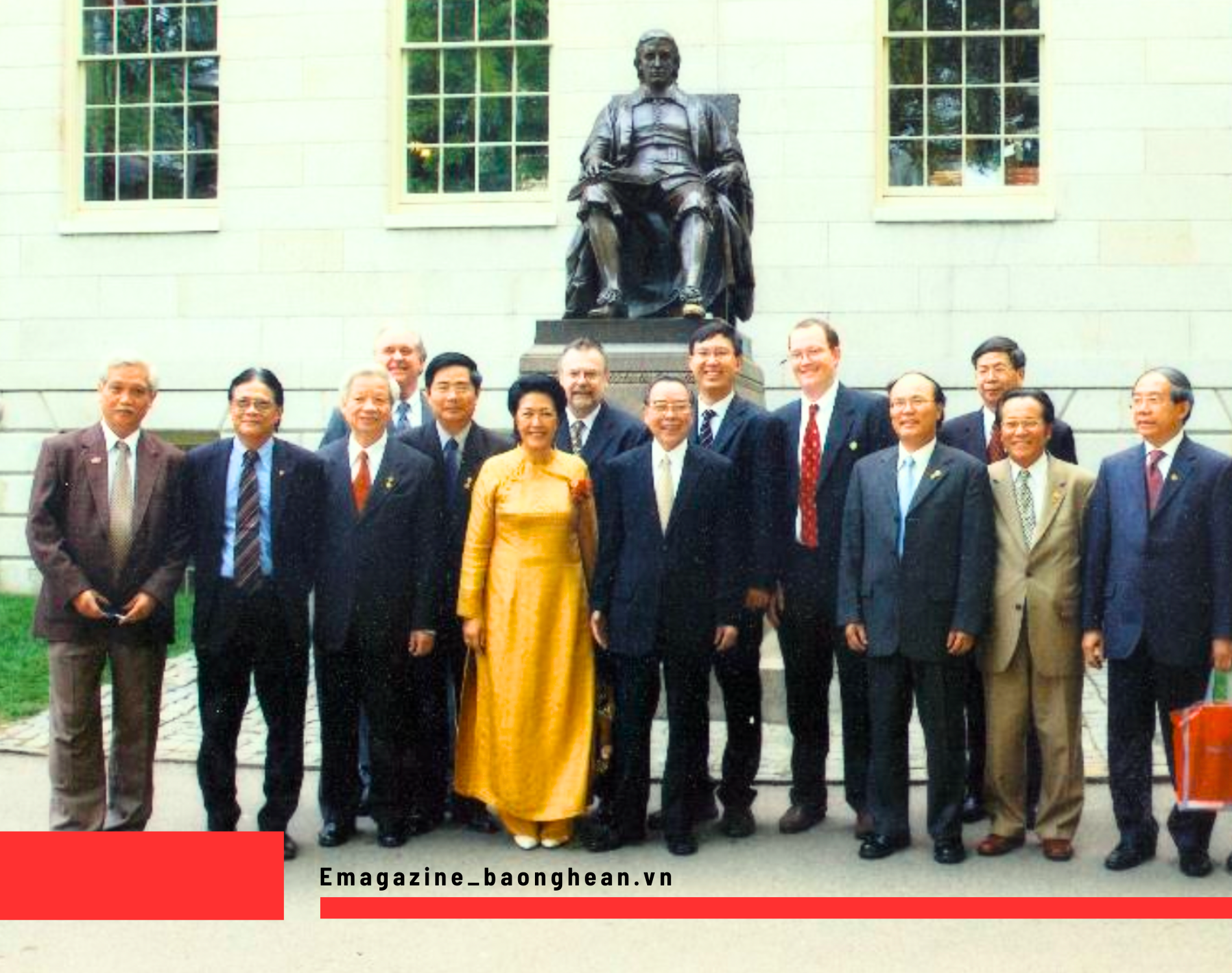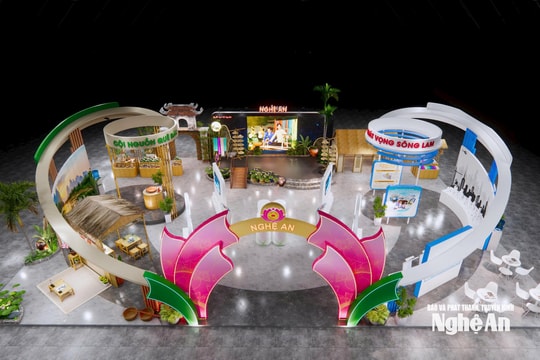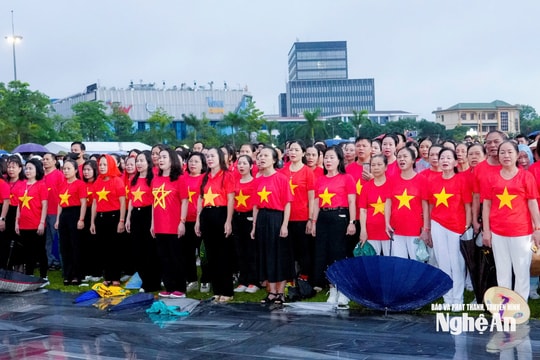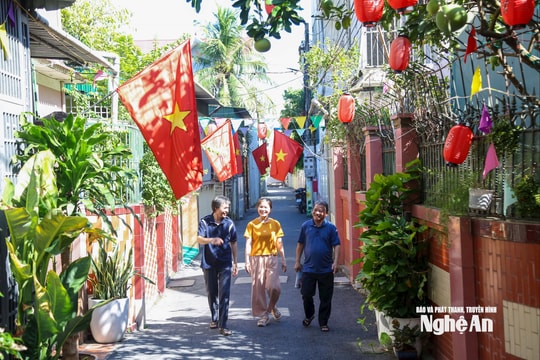Building Nghe An brand from a special historical and political perspective
On the occasion of the 80th anniversary of the August Revolution and National Day September 2, Nghe An Newspaper, Radio and Television had an interview with Ms. Ton Nu Thi Ninh - President of the Ho Chi Minh City Peace and Development Foundation, former Ambassador of Vietnam to the EU, Belgium and Luxembourg, former Vice Chairman of the National Assembly's Foreign Affairs Committee.
.png)
On the occasion of the 80th anniversary of the August Revolution and National Day September 2, Nghe An Newspaper, Radio and Television had an interview with Ms. Ton Nu Thi Ninh - President of the Ho Chi Minh City Peace and Development Foundation, former Ambassador of Vietnam to the EU, Belgium and Luxembourg, former Vice Chairman of the National Assembly's Foreign Affairs Committee. With rich experience and sharp perspective, she analyzed the core values that make up the identity of Vietnamese diplomacy: From soft power in the resistance war, the art of "being unchanging, responding to all changes" to promoting the role of culture and people in international integration. At the same time, she also suggested directions for Nghe An to promote its historical advantages and unique identity, improving the effectiveness of local foreign affairs.
Content: Phuong Chi - Technique: Diep Thanh
.png)
PV:Madam, looking back at Vietnam's 80-year journey of foreign affairs, from the period of "trench diplomacy" to the period of proactive and deep integration, what do you think has created its own unique identity, helping Vietnam always maintain its initiative and mettle amidst unpredictable changes in the world?
Mrs. Ton Nu Thi Ninh:Since the resistance war, we have always had three fronts: politics, military, and diplomacy, connected dialectically and regularly. That combination is applied proactively, because we are right and have a just cause, and thanks to that we are confident; and that confidence helps us to be more proactive.
Facing an opponent that is many times stronger than us, what is required is not only courage, but also alertness to realize: No matter how strong the opponent is, there are weaknesses that we can attack and exploit; conversely, no matter how weak we are, because we stand on the side of justice and righteousness, we have strengths that the opponent cannot have. Therefore, we must have courage, not fear the opponent when we stand on our own righteous feet. But courage alone is not enough, we need to have intelligence, have methods, know how to use our strengths and exploit the opponent's weaknesses.
.png)
During the resistance war, we often had the saying “the strength of the nation combined with the strength of the times”. “The times” here is of the whole world, the strength of progressive people and peace-loving forces all over the world, including within the enemy’s country. Thus, we know how to promote the spirit of international solidarity, against war, for peace; gather and build progressive forces to support us, turn objective weakness into the strength of reason, justice, initiative and courage.
Thanks to the gathering and promoting of that strength, Vietnam has built its "soft power" since the time of resistance. When lacking weapons and being inferior in material, soft power has become an important resource to help us win, making the international community clearly see that although the opponent is strong in military and weapons, he is weak in justice and reason, and in stance in the eyes of the world community. How Vietnam's soft power was promoted during wartime to bring peace, that is a story that should be told, preserved and continued to be promoted in today's era.
.png)
PV:In the context of a rapidly changing global order, disrupted value systems and redistribution of power, how do you evaluate the role and art of "adapting to the changing" of Vietnamese diplomacy in preserving national interests while maintaining prestige and respect from international partners?
Mrs. Ton Nu Thi Ninh:The principle of “adapting to all changes with the same consistency” is especially meaningful in times of stress or crisis. The most important thing is to clearly identify your own advantages and answer the question: What are your strengths in times of stress or crisis? From there, find and create opportunities.
It is important to emphasize that opportunities are never fully available for us to grasp. Once we have identified the direction and field that can create advantages, we must proactively create and foster the conditions for those opportunities to become reality.
.png)
In other words, opportunities only truly form when there is strategic vision, leadership and necessary preparation to develop them. To turn opportunities into living power, one must have intelligence, courage and a thorough understanding of both oneself and the opponent. It is necessary to compare our advantages and limitations with the advantages and limitations of the opponent, from which we can plan the right action strategy. Experience from the resistance wars of the nation in the 20th century shows that we have known how to flexibly apply "adapting to all changes" on the basis of "the unchangeable". The "unchangeable" is the principle of independence, sovereignty and territorial integrity.
In the current context, Vietnam's "4 no's" defense policy(not participating in military alliances; not allying with one country to fight another; not allowing foreign countries to set up military bases or use territory to fight against other countries; not using force or threatening to use force in international relations - PV)is a clear demonstration of the principle of "unchangeable", I think we should keep it as an unchangeable compass, maintaining the principle of independence and sovereignty.
On that basis, we flexibly respond to threats, and at the same time, identify and take advantage of appropriate opportunities. The four pillars of this policy have a very solid strategic vision, serving as the basis for implementing Vietnam's foreign policy in the early 21st century.
.png)
PV:It is known that during her tenure as Vietnamese Ambassador to Belgium and Luxembourg (2000 - 2003), she initiated many cultural diplomacy activities to introduce a profound and vibrant Vietnam. In her opinion, what should we do now to make culture a truly sharp psychological weapon, contributing to the completion of foreign policy goals?
Mrs. Ton Nu Thi Ninh:Regarding the role of culture in diplomacy, it is clear that diplomacy has several legs: Always coordinating harmoniously with the military front in the resistance war, at the same time, closely connecting with the political front, timely domestic affairs. When promoting the cultural dimension, diplomacy has more conditions to contribute effectively and convincingly to Vietnam's soft power.
It is important to understand that “culture” here is not simply performing arts or the entertainment industry, as South Korea has successfully created soft power for this country, but for Vietnam, it cannot be applied like that, but must be applied differently. In particular, we cannot talk about Vietnamese culture without separating it from history. History is an inseparable part of culture, the foundation that creates the national brand, identity and character of Vietnam.

When evaluating the contributions of Vietnamese diplomacy, it is necessary to put the cultural element in relation to the whole, the core of which is people. At the "Vietnam Forum: Vietnamese Moment" organized by the Ho Chi Minh City Peace and Development Foundation in August 2024, I affirmed: "Vietnam's greatest asset is the Vietnamese people, the Vietnamese nation". When implementing cultural diplomacy, we must also rely on that to shine a light on the differences of the Vietnamese people.
I once listened to a podcast introducing Vietnam, in which the first thing that a foreign guest with deep thinking and understanding, the first feature when mentioning Vietnam is “singularity”, that is, uniqueness, difference. That uniqueness needs to be expressed in the cultural dimension and cultural diplomacy.

Another characteristic of Vietnam is the vibrancy of its society and lifestyle. Each country has its own characteristics; among them, Vietnam stands out for its vibrant pace of life. That is the general impression that strongly impacts the perception and senses of international friends. When we bring the cultural dimension into diplomatic implementation, I think we should remember that unique feature of Vietnamese identity, it contributes to the "singularity" of Vietnam.
It is also necessary to emphasize the cultural diversity of Vietnam. With 54 ethnic groups, including 53 ethnic minorities, our country possesses a colorful, rich and unique culture. This diversity is not a limitation, nor is it something that is forgotten in a "corner of the room" or in national awareness, but on the contrary, it is a valuable asset. We must promote the diversity of Vietnamese ethnic cultures, considering this a resource in promoting foreign culture.
On the basis of maintaining national identity, at the same time, expanding exchange and integration, harmonizing these two factors, I think, is relatively stable, flexible and effective.

PV:Local diplomacy is increasingly playing a practical role in attracting investment, promoting image and promoting international cooperation. Particularly for Nghe An, can you share your recommendations for the province to effectively promote the role of diplomacy in the integration process?
Mrs. Ton Nu Thi Ninh:Regarding local foreign affairs, I find this an interesting idea, worth thinking about and exploiting, a promising field. I do not dare to affirm that it has been widely successful, but the potential is huge, because it comes from the diversity, uniqueness and rich vitality of Vietnamese localities.
I see an example of Ninh Binh province (before the merger) that has implemented quite a methodical local brand building to attract not only tourists but also investors. This suggests that the national brand is a whole, but each locality, each organization, and each social component can contribute to that overall, colorful, and diverse picture of Vietnam.
.png)
To ask that question to Nghe An, there should be a project. For Nghe An, in my opinion, there are many advantages, being the homeland of President Ho Chi Minh, that brings a very special historical and political aspect, and it is necessary to identify other values on the journey of building a local brand.
International experience shows that many countries have outstanding local brands: Korea has Busan, Japan has Kyoto, China has Shanghai, America has Silicon Valley or Hollywood...
This is certainly not simple for Nghe An but is absolutely necessary and feasible if there is strategic thinking. I advise Nghe An to refer to the experience of Ninh Binh. I have read a project of Ninh Binh and found them bold and creative. I wish Nghe An to implement a new, effective and unique local foreign affairs project.
PV:Thank you very much!
.png)
Ms. Ton Nu Thi Ninh was born in 1947 in Hue, a descendant of the Nguyen Dynasty royal family, a veteran Vietnamese diplomat with more than 40 years of experience in the field of diplomacy and foreign affairs; held the position of Vietnamese Ambassador to Belgium and Luxembourg and the EU, from 2000 to 2003 and initiated many cultural diplomacy activities.
From 2003 to 2007, as Vice Chairwoman of the National Assembly's Foreign Affairs Committee, she participated in human rights issues and promoted the process of "normalization" and improved relations with the overseas Vietnamese community.
She was awarded many medals at home and abroad, including: First Class Labor Medal of the Government of Vietnam (2008), Legion of Honor of the Government of France (1998 and 2013, Commander rank) and Leopold II Medal of the Government of Belgium (2003).
She is currently the President of the Ho Chi Minh City Peace and Development Foundation.


.jpg)




